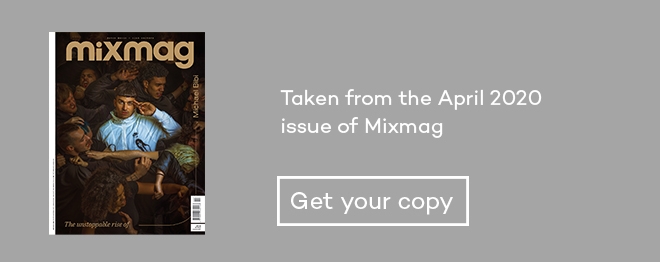 Comment
Comment
Why are superstar DJs so keen to reconnect with the underground?
Producers turned popstars have made their millions, and now they want to trade the big stages for basements
Imagine it: You’re top of the Forbes DJ Rich List, earning £1 million per gig at a Vegas residency. You’ve had a decade-long string of global hits, your bronzed body advertises Armani underwear and it’s highly likely that your ex, Taylor Swift, wrote a song about you. Celebrity recording sessions at your LA mansion have replaced stacking supermarket shelves in Dumfries. Yes, you are Calvin Harris. Recently you released a two-track EP as ‘Love Regenerator’, with an underground sound that earned plaudits from the likes of Skream and ended up in Mixmag’s Big Tunes. But why bother?
Read this next: Calvin Harris reveals new Love Regenerator alias with rave-focused tracks
Why did fellow platinum pop star David Guetta invent a new underground alias, and Deadmau5 make techno for Richie Hawtin’s label? Why are artists who’ve conquered the mainstream so determined to retain their links – or reconnect – to underground credibility?
Harris says he wanted to “rediscover the way I originally began producing music twenty-two years ago, before I ever thought about how it might be perceived by outside forces”. What he describes as “just pure fun and experimentation” might seem to the more cynically minded like a calculated jump on the current bandwagon for Amen break-based bangers and 90s trance updates, but the man spearheading the recent rave revival, Paul Woolford AKA Special Request, responded on Twitter with ‘GO ON SON’ – and confirmed the pair have been “having a natter”.
Read this next: What DJs really earn
Others were less kind, Andrew ‘Lovefingers’ Hogge commenting: “the dude was actually there for the first wave and came up on this shit, he just chose to go commercial garbage”, while Jozef K skewered the tracks as “exactly what you’d expect an EDM producer trying to make something proper would sound like”. Cold.
It’s a long way back for producers who ‘outgrew’ their original scene, or dropped it in favour of chasing pop success. Just behind Harris on the highest-paid DJs list, David Guetta has become synonymous with platinum-selling global hits and the type of set memorably described in these pages as “cheesier than a Frenchman’s sock”. Yet his origin was playing hip hop and acid house alongside the likes of Laurent Garnier in the gay clubs and warehouse parties of Paris. In 2018, Guetta confirmed that he was behind the 4/4-focused Jack Back alias: “I wanted to make music just for fun, with absolutely no commercial approach to it… I’m doing it for the love of music,” he said. When Deadmau5 swapped his mask for the Testpilot moniker, releasing some creditable techno on Plus 8, he said: “I’ve always aspired to be a little more underground, I listen to techno, really dubby old stuff, and I like it.”
Speaking to a few industry veterans, it’s clear these aren’t isolated cases. “Because most DJs start in the underground, or at least are inspired by underground scenes, the most satisfaction and kudos comes from playing in that environment,” one publicist told us. “DJs who become that big and cross over will miss it – that’s why they reinvent themselves with an alias: they want to be connected. I know some EDM DJs who are internationally huge, household names, but secretly want to be Seth Troxler. What other DJs think about them is really important.”
Another artist manager argues, with some justification, that the likes of Harris and Guetta are clearly talented songwriters and producers whose success has earned them the right to do what the fuck they like, and if that means trying to recapture their underground cred, where’s the harm? However: “It can be a great thing if said acts use their money/influence to direct people back to the underground, but a lot of them have their fun, gain some credibility points and then head back to their usual output, having contributed nothing; and that’s a problem.”
Read this next: Unhealthy scene: How sky-high DJ fees are crippling dance music
Perhaps it’s a bit more complex, though. Anyone who’s seen the documentary that charted the immense pressures on Avicii knows that a lot of people rely financially on a star’s success. They become too big to fail, unable to stop the train and the revenue stream even if they wanted to. Take Calvin’s quote citing ‘outside forces’. The wider public is not likely to crucify him for making techno rather than another tune with Rag ’n’ Bone Man – so does he mean the people who depend on him for a living, or the pop/major label/industrial complex? Is Guetta saying that his risible collaborations with the likes of Snoop Dogg aren’t ‘fun’? The idea of these artists trapped in a golden hamster wheel, churning out hits, their side projects more a cry for help than a well timed ‘brand refresh’ is intriguing – and slightly depressing. Cynics, of course, will point to the fact that the mainstreaming of techno and decline of the big-room EDM sound are exactly the kind of ‘market forces’ that responding to got them such success in the first place.
Many producers who stick to their artistic guns won’t ever be able to quit the day job (some even end up ghost writing chart hits to pay their mortgages), while others with luck, better timing and a knack for a hit will one day realise that private jets, the Forbes Rich List and major label deals aren’t what it’s all about, the poor dears. But the pop-dance of the last decade has been a useful Trojan horse for getting people back in clubs and at festivals, sparking a connection with underground culture in many. Maybe there’s no harm in letting the people who made it – if they are sincere – do the same.
Peter Walker is a regular contributor to Mixmag, follow him on Twitter
Read this next: Get the best of Mixmag direct to your Facebook DMs



